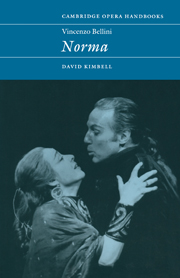Book contents
- Frontmatter
- Contents
- List of plates
- General preface
- Dedication
- Preface
- A note on Italian prosody
- A note on the vocal score
- 1 The composition of the opera
- 2 Medea – Velleda – Norma: Romani's sources
- 3 Synopsis and musical frame
- 4 Music and poetry
- 5 A glimpse of the genesis of the opera
- 6 Some variant readings
- 7 Contemporary reactions to Norma
- 8 Critical fortunes since the Unification of Italy
- 9 Five prima donnas: contributions to a performance history
- Appendices
- Notes
- Bibliography
- Index
7 - Contemporary reactions to Norma
Published online by Cambridge University Press: 05 June 2012
- Frontmatter
- Contents
- List of plates
- General preface
- Dedication
- Preface
- A note on Italian prosody
- A note on the vocal score
- 1 The composition of the opera
- 2 Medea – Velleda – Norma: Romani's sources
- 3 Synopsis and musical frame
- 4 Music and poetry
- 5 A glimpse of the genesis of the opera
- 6 Some variant readings
- 7 Contemporary reactions to Norma
- 8 Critical fortunes since the Unification of Italy
- 9 Five prima donnas: contributions to a performance history
- Appendices
- Notes
- Bibliography
- Index
Summary
After the second performance of La straniera in February 1829, the Gazzetta privilegiata di Milano had remarked: ‘Amid the irruption of the Rossinian torrent, it is no small thing that a young composer should signal the first steps in his career by attempting a genre that could be called new for the present period. Not only is he the restorer of Italian music, but also – a modern Orpheus – he has resuscitated the beautiful melody of Jommelli, of Marcello, of Pergolesi, with beautiful song, with splendid, elegant, pleasing instrumentation’ (quoted in Weinstock 1972, p. 66).
Bellini enjoyed a notably successful career; of his ten operas only Zaira and Beatrice di Tenda failed to receive the most enthusiastic welcome from his contemporaries. As these comments on La straniera show, however, he was widely, and surely correctly, perceived as stepping aside from the mainstream of modern Italian music, so brilliantly represented by Rossini. To do that was to be, in some measure, controversial. Bellini's operas, particularly those produced in Milan, the spiritual centre of the Romantic movement in Italy, excited debate in a way that Donizetti's operas, or even Verdi's earlier operas, rarely did.
Togn and Pepp
We may begin with one of the most unusual tributes ever paid to an opera. Within a few weeks of the premiere, Carlo Angiolini, a Milanese dialect poet, published La Norma resiada (The Norma Debate), in the form of a ‘dialogh tra el Scior Togn e tra el Scior Pepp’ (Dialogue between Signor Tonio and Signor Peppino).
- Type
- Chapter
- Information
- Vincenzo Bellini: Norma , pp. 89 - 96Publisher: Cambridge University PressPrint publication year: 1998



